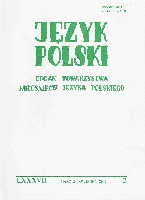Niektóre formy adresatywne w języku mieszkańców wsi (na przykładzie gminy Zakliczyn nad Dunajcem)
A selection of honorific forms used by rural populations in Poland (on the example of Zakliczyn by Dunajec community)
Author(s): Anna PiechnikSubject(s): Language and Literature Studies
Published by: Towarzystwo Miłośników Języka Polskiego
Keywords: honorific forms; pluralis maiestaticus; Polish dialects; Zakliczyn
Summary/Abstract: The subject of the article is honorific forms used in Zakliczyn by Dunajec dialect (Tarnow district) when talking about people who are not present at the moment of speaking. Among members of these communities the most commonly used forms when speaking about a doctor or a teacher are Pan and Pani (correspondingly a male and female form; however, Pan is not used when a male teacher is being talked about). In spoken language these forms are usually followed by a person's surname or profession, which is considered inappropriate in formal language. Female affixes denoting a wife or a daughter: -ova, -ina (-yna), -ka, aηka, -uvna, disappearing in Polish language, can still be found in this dialect (e.g. Puotokuovo, Zygadlyno, Novocka, Tobuoloηka) and they carry a variety of emotional tones. When older women are directly addressed, “family words” are used to emphasize respect, such as: ciotkuo, bapkuo, kšesnomatkuo (correspondingly: aunt, grandmother, godmother, in the vocative form). No corresponding forms of address for male family members are found. There is also pluralis maiesticus, a form carrying an extra mark of respect, which is used when addressing the oldest generation.
Journal: Język Polski
- Issue Year: 2007
- Issue No: 1
- Page Range: 66-69
- Page Count: 4
- Language: Polish

